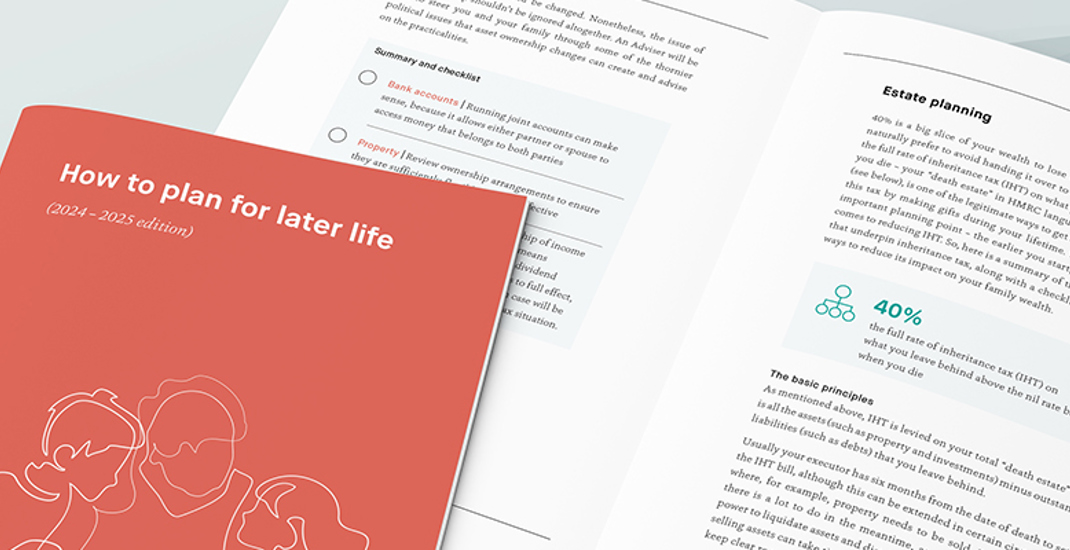What are the levers of long-term growth?
Undoubtedly this is a complex question but if we focus purely on maximising the growth of any long-term investments only, there are a few fundamentals that will have the biggest impact on your ability to achieve growth.
- Start early. The earlier you start saving and investing, the more time your money has to grow, especially if you reinvest any income to benefit from compound growth (i.e., when you not only earn returns on your initial investment but also on any previously accumulated gains, enabling accelerated growth). You can also afford to take on a little more risk, when you have longer time horizons.
- Invest regularly. Even if you only start with small amounts each month, it will add up over time, and having built the behaviour, you can increase the amounts as your income grows or as you can afford to save more. Investing regularly also helps smooth out market volatility by investing at different points (i.e., to average out catching the lows and highs).
- Target performance. Someone with long-term time horizons, will be able to focus on long-term growth performance, to outperform Inflation. As your time horizons reduce, you will likely want to sacrifice some performance to instead reduce risk and volatility but if you have time on your side, you may allocate more of your investments towards assets with greater potential to achieve long-term growth.
- Understand any costs. Costs act as a drag on any gains your investments make, so it is important to ensure you understand and minimise costs where possible, without limiting any associated value (for example taking on too much responsibility yourself, unless you are confident you have the time, knowledge and inclination to do so). You also need to be aware of layers of fees, which can sometimes make it hard to compare headline rates for different options or providers, side-by-side.
“Even if you only start with small amounts each month, it will add up over time.”
Tim Bennett
Capital at Risk
Capital at Risk
Capital is at risk. Past Performance is not an indication of future performance, and you may not receive back the same amount you put in when you choose to cash out your savings.

Tips for growing your lifetime savings
- Set financial goals. Having specific financial goals will help you stay motivated to save and invest.
- Make a budget and revisit it regularly. Tracking your income and expenses can help identify areas where you could cut back and to check that any rainy-day funds are realistic to cover you through periods of financial challenge, so you don’t have to draw upon long-term savings.
- Automate your savings. Set up a recurring transfer from your current account to other accounts for your short-, medium- and long-term savings so that you don’t even have to think about it.
- Live within your means. One of the best ways to save money is to spend less than you earn. Beware of lifestyle creep, and spending on discretionary non-essential items, as your income and standards of living improve.
- Take advantage of tax-efficient saving and investing. To successfully grow your savings over time, you will also want to minimise the amount of tax you are required to pay on any gains. If affordable, tax wrappers (such as ISAs and SIPPs) should always be used as they offer beneficial tax treatment. For those investing above individual annual allowances for tax wrappers or for those with complex situations, you might want to consider getting professional advice from a Wealth or Financial Planner.
- Invest for the long term. Don’t try to time the market. Instead invest for the long term and focus on growing your wealth over time.
Tax Treatment
Tax Treatment
The tax treatment depends on the individual circumstances of each client and may be subject to change in the future.
Common mistakes to avoid
-
Not saving enough money. Make sure that you are saving enough money to meet your financial goals. A Wealth or Financial Planner can help you with identifying these issues using cashflow analysis.
-
Taking on too much risk. When investing, it is important to choose investments that are appropriate for your risk tolerance. This is something that an Investment Manager can help you to understand. You can also watch our Killik Explains playlist on lifetime savings-the-risks here.
-
Selling investments in a panic. Don’t panic sell your investments if the market takes a downturn, especially if you have never experienced a downturn or a market cycle before. Instead stay focused on your long-term goals.
-
Not being adequately diversified and not rebalancing your portfolio periodically. You want to ensure you are well diversified, to limit your chances of experiencing large losses relating to one negative event. And with a diversified portfolio, different assets and strategies will perform at different levels and cycles, so it is important to rebalance periodically, to maintain your chosen asset allocation. Watch our Killik Explains video for more on market cycles and diversification here
We have a range of Killik Explains educational videos on this subject.
This page scratches the surface of what is a complex and personal topic. Our team of Investment Managers and Wealth Planners would be happy to speak with you to understand your personal circumstances and discuss how we would go about constructing a Financial Plan and an Agreed Investment Approach tailored to you.
Sign up to receive the latest news from Killik & Co, including our Market Update and Killik Explains educational videos, and be one of the first to hear about upcoming events and webinars. You can unsubscribe at any time and learn how we use your data in our Privacy Policy.
Sign me up to the latest emails from Killik & Co. We will not share your details with anyone else and you can unsubscribe at any time by clicking “change preferences” at the bottom of our emails.






